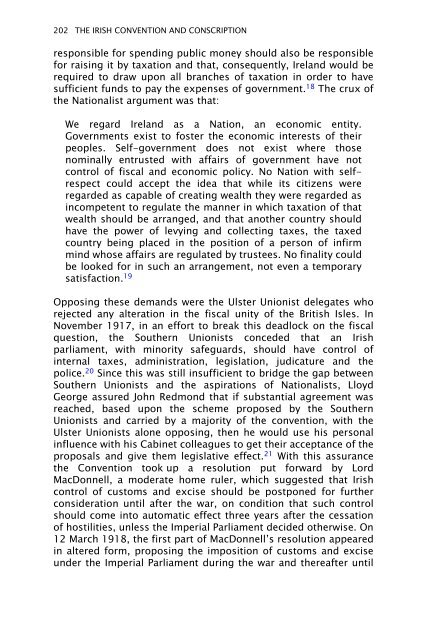Dividing Ireland: World War I and Partition
Dividing Ireland: World War I and Partition
Dividing Ireland: World War I and Partition
You also want an ePaper? Increase the reach of your titles
YUMPU automatically turns print PDFs into web optimized ePapers that Google loves.
202 THE IRISH CONVENTION AND CONSCRIPTION<br />
responsible for spending public money should also be responsible<br />
for raising it by taxation <strong>and</strong> that, consequently, <strong>Irel<strong>and</strong></strong> would be<br />
required to draw upon all branches of taxation in order to have<br />
sufficient funds to pay the expenses of government. 18 The crux of<br />
the Nationalist argument was that:<br />
We regard <strong>Irel<strong>and</strong></strong> as a Nation, an economic entity.<br />
Governments exist to foster the economic interests of their<br />
peoples. Self-government does not exist where those<br />
nominally entrusted with affairs of government have not<br />
control of fiscal <strong>and</strong> economic policy. No Nation with selfrespect<br />
could accept the idea that while its citizens were<br />
regarded as capable of creating wealth they were regarded as<br />
incompetent to regulate the manner in which taxation of that<br />
wealth should be arranged, <strong>and</strong> that another country should<br />
have the power of levying <strong>and</strong> collecting taxes, the taxed<br />
country being placed in the position of a person of infirm<br />
mind whose affairs are regulated by trustees. No finality could<br />
be looked for in such an arrangement, not even a temporary<br />
satisfaction. 19<br />
Opposing these dem<strong>and</strong>s were the Ulster Unionist delegates who<br />
rejected any alteration in the fiscal unity of the British Isles. In<br />
November 1917, in an effort to break this deadlock on the fiscal<br />
question, the Southern Unionists conceded that an Irish<br />
parliament, with minority safeguards, should have control of<br />
internal taxes, administration, legislation, judicature <strong>and</strong> the<br />
police. 20 Since this was still insufficient to bridge the gap between<br />
Southern Unionists <strong>and</strong> the aspirations of Nationalists, Lloyd<br />
George assured John Redmond that if substantial agreement was<br />
reached, based upon the scheme proposed by the Southern<br />
Unionists <strong>and</strong> carried by a majority of the convention, with the<br />
Ulster Unionists alone opposing, then he would use his personal<br />
influence with his Cabinet colleagues to get their acceptance of the<br />
proposals <strong>and</strong> give them legislative effect. 21 With this assurance<br />
the Convention took up a resolution put forward by Lord<br />
MacDonnell, a moderate home ruler, which suggested that Irish<br />
control of customs <strong>and</strong> excise should be postponed for further<br />
consideration until after the war, on condition that such control<br />
should come into automatic effect three years after the cessation<br />
of hostilities, unless the Imperial Parliament decided otherwise. On<br />
12 March 1918, the first part of MacDonnell’s resolution appeared<br />
in altered form, proposing the imposition of customs <strong>and</strong> excise<br />
under the Imperial Parliament during the war <strong>and</strong> thereafter until








